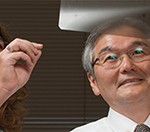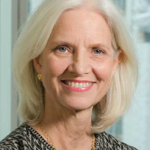Dr. Yokoyama, along with Klas Karre, MD, PhD, professor of microbiology at the Karolinska Institute in Stockholm, Sweden, and Lorenzo Moretta, professor of medicine at the Università degli Studi di Genova in Genoa, Italy, was awarded the Novartis Prize for Immunology in 2001. His lab today continues with threads emanating from the Ly49 work, identifying Ly49H as the activation receptor responsible for resistance to murine cytomegalovirus (CMV) infection and the role of Ly49 inhibitory receptors in the development of NK self-tolerance.2
Dr. Yokoyama conceded that there is a certain irony about his discoveries’ indirect connection to rheumatology. “In a sense,” he says, “I divorced the scientific investigation part of my job from my clinical responsibilities. One could try to force the issue, and try to find a reason for studying NK cells in rheumatic illnesses. But I have been fortunate enough to work for Shevach, [Ira Goldstein, MD, a former ACR president], and others, whose premise was just do good scientific work and see where it takes you. It’s of course not clear if [our discoveries] will make an impact in the rheumatology clinic, but they may end up having a big impact in HIV or CMV infection. And there is some emerging data that NK cell receptors could play a role in RA, so who knows?”

A Public Service Role
Now having 2,025 members, the NAS was established in 1863 under President Abraham Lincoln. Its mission is to foster the furtherance of science and its use for the general welfare. The NAS has a powerful opportunity “to bring the most logical, scientific, and insightful appreciation to problems in a way that is honest, transparent, and not influenced by a political orientation or special interest,” says Dr. Brenner.
Dr. Yokoyama expects the challenges of NAS membership to include his concerns about scientific literacy. “As a rheumatologist, it is appalling to me how many people believe a testimonial is equal to a placebo-controlled, double-blind trial as evidence for efficacy of a drug,” he says. “We, as scientists, should be doing a better job of educating the public about the way in which science is conducted.”
Advice for Young Investigators
Asked how young rheumatologists might prepare themselves for the next generation of important discoveries, Dr. Brenner recommends they include “a very deep, intense, research-focused experience” in their training at some point. For laboratory-oriented physicians, that would include the “most fundamental research that will teach you the principles of science,” he notes. Similarly, clinical researchers should also seek out immersion in the fundamental approaches to discovery. “A very nice way to approach one’s post-doctoral training,” Dr. Brenner says, “is to make one experience very fundamental and the other more applied. Then, some combination of the two can give you a broad appreciation for disease as well as the basic scientific method to approach it in a very substantial and original way.”

